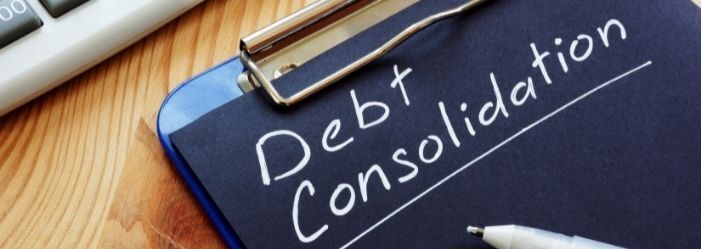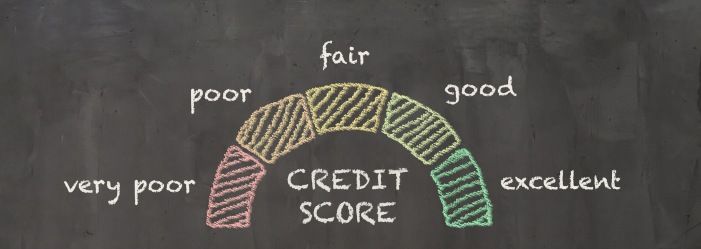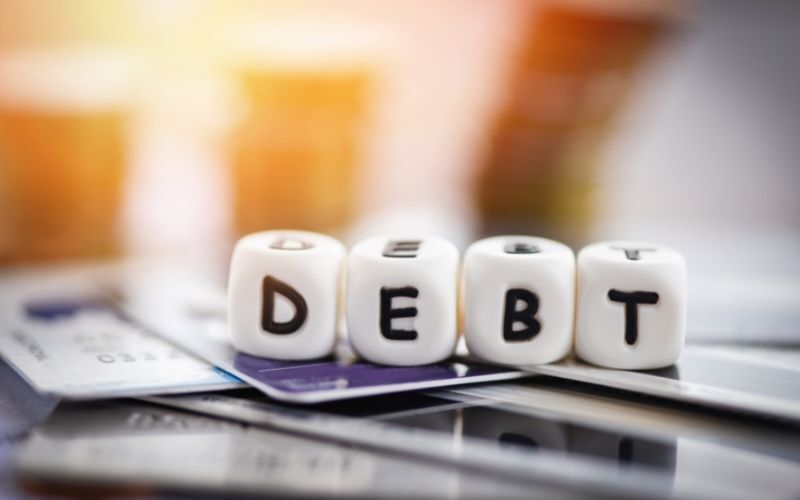Last Updated: October 11, 2023
Find out how debt consolidation loans work

If you have a lot of debt, you may be looking for a debt consolidation loan to consolidate debt and pay it off. Otherwise known as a personal loan, a debt consolidation loan can help you pay off debt using the loan amounts.
However, you may also have bad credit and think you cannot get a
debt consolidation loan with bad credit or any type of personal loan at a reasonable interest rate. Is it possible to get a
debt consolidation loan with bad credit or for that matter any loan with bad credit?
Yes - a low credit score does not preclude you from getting a loan, but you may pay a lot of interest for it. Let's take a look at your loan options.
What is a Debt Consolidation Loan?
The goal of a debt consolidation loan is to get one loan and pay off most or all of your debt. You then focus on paying off the debt consolidation loan. In order to be most effective, the loan must have a lower interest rate than the existing debt interest rates.
A debt consolidation loan eliminates multiple monthly payments and turn multiple debts into one debt, making management easier and it is important to understand how debt consolidation might affect your credit score. Explore various debt consolidation solutions to eliminate debt on our website.
Most financial websites, including ones for credit union loans, offer a debt consolidation calculator. You can use these to see if a debt consolidation loan is worth the effort and determine if a debt consolidation loan is right for you. Because bed credit means that your interest rate is high, that may make getting a loan pointless.
To learn more about its working mechanism, read
What is Debt Consolidation and How Does It Work?
What is a Good Credit Score?

A good credit score is over 670 (FICO) or 661 (VantageScore). Your credit score is generated from your credit history. All your debt repayment is gathered onto a credit report and run through an algorithm that gives the credit score. Because not all information is reported to all credit reporting bureaus, your credit score may be slightly different based on the different credit reports.
What is a Minimum Credit Score?
Many lenders have a minimum credit score requirement of 620.
What does A Bad Credit Score Mean?
Basically, a poor credit score indicates that you are a bad risk to lend money to because you probably do not make timely debt payments. Your credit score is based on five factors: paying monthly debt payments on-time, keeping your debt to credit ratio low, how long you have had credit, what types of credit you have, and if you have applied for new credit recently.
The first two most important ones are paying bills on-time and getting your debt to credit ratio below 30%. Low credit scores generally mean you do not have a great track record of paying your debts. Lenders will look at the credit score from your actions and decide if you are worth the risk. They will look for a minimum credit score of 620.
What Credit Score Do I Need for a Debt Consolidation Loan?
Most lenders have minimum credit score requirements, often around 620-650. The higher your credit score, even by a small amount, the better your chances of getting approved and securing a lower interest rate on a consolidation loan.
Before applying for a loan, check your credit reports from Equifax, Experian, and TransUnion to understand your starting point. Watch for any errors that may be unfairly lowering your scores - if found, dispute them with the credit bureaus. You can also take steps to improve your credit, like paying bills on time and paying down debts. Even a minor boost can make you a more attractive borrower.
Use free tools from sites like Credit Karma to monitor your credit score. This allows you to check if your credit-building efforts are working before applying for a loan.
What can you do to get a debt consolidation loan for bad credit?
Fix Bad Credit
The first option in getting a better interest rate on a loan is to fix your credit. This takes time, so it may not be ideal. You should work on improving your credit score to meet minimum credit score requirements while looking for a debt consolidation loan. We've discussed improving credit scores in previous blogs.
The Steps to Fixing Bad Credit
In this, we will hit the highlights in order.
- Get a copy of your credit report from the big three credit bureaus. Fix any errors on your credit report by writing the company with documentation.
- Begin making monthly payments on time. This single action represents 35% of your credit score and will begin raising your low credit score each month that you pay on time.
- Pay down debt on revolving loans like credit card debt. The better your debt to credit ratio, the better your credit score. This represents 30% of your credit score.
- Don't sign up for any more credit cards. Each time you apply for a credit card, your credit score is dinged, even if you do not use the credit card.
- Improve your debt to income ratio by paying down debt, especially credit card balances. Debt to income looks at how much debt you have compared to how much income. The lower your debt, the better this debt to income ratio is.
- Put away credit cards for six months and focus on improving your minimum credit score.
- Sign up for a free credit score monitoring service like CreditKarma to track your improving credit score.
But wait, you may be saying, I can't pay down my debt. That's why I need a debt consolidation loan. Now, we will look at different options for a loan. Just keep in mind improving your credit score while you are looking for a loan and afterward.
Types of Debt Consolidation Loans
What are the best debt consolidation loans for you? That depends. Below, we have listed options for debt consolidation loans for bad credit as well as debt consolidation loan alternatives to look at with the pros and cons.
HINT: Always understand the loan terms and use the loan funds to pay off your debt.
Bank or credit union loans
Banks and credit unions should be your first stop for a fixed rate loan. If you have a relationship with a financial institution, you may have a better shot at getting a loan even if you have bad credit.
Since credit unions are not-for-profit, credit unions often have better interest rates than banks that must show a profit to their shareholders.
Bear in mind that you will pay an origination fee on your debt consolidation loans from both a bank or a credit union. You need to factor these origination fees into the loan or pay them upfront.
Rolling the origination fee into the loan decreases the amount available to pay off your bills. In addition, your origination fee can be steep.
You may be able to find a lender, especially through credit unions, who will look at your education, income, and factors other than your minimum credit score.
Most debts do not come with prepayment penalties as the lender is happy to get their money early. Understand the credit union or bank loan terms. Also, focus on making your monthly payment on-time to avoid any dings to your credit score.
Online Debt Consolidation Loans
Some online companies specialize in bad credit loans. In general, bad credit borrowers are considered for loan amounts between $1,000 and $50,000. The issue is the interest rates. They can be as much as 24-35%. Because online lenders do not have as large an overhead and possibly no stock holders, they may be more willing to work with you.
Always understand what you are signing up for - the interest rates may be higher than the ones on loans you are trying to pay off! Shop online lenders for the best terms. These may also come with origination fees.
Again, always make your monthly payment on time to avoid future bad credit scores.
P2P Loans
P2P or peer to peer loans are online lenders that may offer better interest rates even on poor credit. With a P2P loan, someone (or a group of someones) lend you money and you repay them with monthly payments. Because they are not a bank, they are not as bound to consider credit scores. P2P loans also have origination fees.
Again, know what you are agreeing to! A good P2P loan may be among the best debt consolidation loans, just be aware that the origination fee can be steep.
Payday Loans and Car Title Loans
Payday loans and car title loans are scams run by predatory lenders. Do not apply for a payday loan or a car title loan! Both are short term loans with extremely high interest rates and harsh loan terms. These rates can exceed over 400 - 500%.
This means that for every $100 you borrow, you repay $400 to $500. Payday lenders are there to make money off you - do your own research and independently verify what they are telling you.
In addition, with a car title loan, you can lose your car if you fail to repay the loan. A payday loan can become a massive debt very quickly.
The payday loan industry was deregulated during the Trump administration, leaving consumers with no protection from these predatory lenders. These loans are very bad options for debt consolidation loans.
Secured Loans
Secured personal loans have something of value backing or securing the loan. If you fail to pay, the lender can seize the item in order to pay the secured loans. Secured personal loans can include a home equity loan, car title loan, life insurance loan, and pawn shop loan.
A secured personal loan usually has lower a interest rate than unsecured loans. The problem is that if you fail to repay secured loans, you can lose the items securing them. Use a home equity loan option carefully.
The loan amount is limited by the value of the security. If you need large loan amounts, your house may be your only option.
If you have the ability to secure a loan, these may be the best debt consolidation loan that you can find.
Cosigned Loan
Cosigning means that you find someone with a better credit score to sign for the personal loan. That person is then also responsible to repay the loan amount.
Do not co-sign for a personal loan without knowing what you are getting into. Someone with good credit can have their credit ruined if they choose to co sign on a personal loan with someone who does not repay it.
Debt Consolidation Company
There are companies that specialize in debt consolidation for bad credit. The companies work with your to find the best debt consolidation loans and then pay off your debt using the loan proceeds.
Debt Settlement
Debt settlement means that you negotiate with a creditor to forgive all or part of a debt in return for a lump sum payment or occasionally, a payment plan. This can be very effective and is Pacific Debt's specialty.
There are some downsides including potential tax consequences and temporarily decreased credit scores. Debt settlement does not include consolidation loans for bad credit, but it does mean that you can get out of debt within 2-4 years.
For more information on debt settlement, read our article Debt Consolidation Vs Debt Settlement
Nonprofit Credit Counseling Agency
Credit counseling involves working with credit counselors to understand basic finances and debt repayment. You will learn more about budgeting and how to set up and live by a budget.
Credit counseling is never a bad idea, but it may not solve your problems as immediately as consolidation loans for bad credit. Look for a nonprofit counseling agency and a certified credit counselor you are comfortable with.
Debt Management Plan
Debt management plans are important and will be something you set up when using credit counseling, debt settlement or debt consolidation. In a debt management plan, you set up a budget and make plans to pay off debt while not acquiring more.
You may or may not apply for debt consolidation loans for bad credit with a DMP.
Borrow from 401K
Your 401K or retirement account may seems to be a perfect source of money for your immediate needs. The problem is that the IRS will take their pound of flesh and more if you make withdrawals from a retirement account, regardless of the loan amount. Before you do this, talk to a certified accountant, tax lawyer, or similar professional. You may end up with a huge tax bill.
Borrowing from a 401K or retirement account is a poor way to get debt consolidation loans for bad credit.
Zero Balance Transfer Credit Card for Credit Card Debt
Another option for debt consolidation is a zero balance transfer credit card. With this option, you take out a credit card with a 0% APR. You then transfer your credit card debt onto this card, thereby paying off the other credit cards.
The issue with this includes:
- balance transfer fee - these are usually a percentage of the transfer, usually between 3% and 5%. This means you pay between $3 and $5 on every $100. It adds up!
- limited introductory APR - the 0% will end in a certain amount of time. The subsequent interest rate may be quite high. You must be able to pay off the balance or loan amount before the introductory period ends.
- high APR - if you use the card during the zero APR, you may be charged a higher APR for those purchases. Always understand what you are signing up for to avoid getting into worse debt!
Should You Apply for Debt Consolidation Loan?
Now that you have some options and pros and cons for each, should you apply for a debt consolidation loan?
Here are some questions to ask:
- If you are considering a secured loan, can you afford to lose what is securing the loan?
- Can you get loan amounts that will make a difference?
- Can you set aside your credit cards for six months and focus on paying down your debt on time? If yes, do that immediately. If no, you may need some credit counseling before you try anything else.
- Can you get a better interest rate than the interest rates you have on your existing loans?
- Can you pay off your bills and then not run up more debt? If yes, a debt consolidation loan is a great idea. If not, we recommend counseling.
- Will you save money by paying off the debt?
- Shop around with multiple lenders to get the best rate. Just ask them to do a soft pull first to get an approxiemte interest rate. That way your credit score is not dinged.
I've got a personal loan, what now?
Now you need to manage the loan. In order to make the best debt consolidation loans decisions, what should you do next?
Pay the bills. This may seem obvious but this sudden windfall may seem better spent on a vacation, new purchases, etc. NO!!! Pay off your debts immediately.
Contact each creditor to get a pay off amount and pay it immediately. Otherwise, you may end up with interest to pay, especially on credit card bills.
Set up a budget and live by it in order to stay out of debt.
Pay your bills on time every time. Put your credit cards away for at least a month, preferably six months, to learn to live without them.
Alternatives to Debt Consolidation Loans
If you can't qualify for a favorable consolidation loan, consider these alternatives:
- Call your creditors to request lower interest rates or modified repayment terms. Explain your financial situation and ask if they can work with you. Be persistent and contact the customer retention department if needed.
- Work with a nonprofit credit counseling agency to receive budgeting assistance and set up a debt management plan. This involves negotiating lower interest rates and payment plans with your creditors, then making one monthly payment to the agency.
- Debt settlement companies negotiate with your creditors to settle accounts for less than you owe. This can save money but may damage your credit and result in tax liabilities. The process takes 2-4 years.
- Filing for bankruptcy provides legal protection as your debts are discharged. However, it severely damages your credit for 7-10 years. Consult a bankruptcy attorney to understand if it's the right option.
- Read our in-depth guide on alternatives to debt consolidation for more information.
Avoid Predatory Lenders

Steer clear of predatory lenders promoting debt consolidation loans at absurdly high-interest rates. These companies target those with poor credit and limited options.
Warning signs of a predatory loan include:
- Exceedingly high interest rates, sometimes over 100% APR
- Pressure tactics to sign the loan quickly
- Requests for you to falsify information on the application
- Hidden fees that get added at the last minute
- Constant loan refinancing with additional fees each time
Predatory lenders benefit from trapping borrowers in a cycle of high-cost debt. You end up paying far more in interest and fees compared to mainstream lending options.
Accepting a predatory loan can lead to even higher monthly payments and make it harder to get out of debt. It goes against the purpose of a debt consolidation loan, which is to make repayment easier.
Before signing any loan agreement, read the fine print carefully and make sure you understand the full costs involved. Avoid business practices like those described above, and don't fall for too-good-to-be-true offers.
Resources
There are various helpful tools and resources for learning more about credit improvement, debt management, and your options.
Credit Reports
- AnnualCreditReport.com - Get free annual credit reports from the major bureaus
- Credit Karma - Free credit monitoring that updates whenever your score changes
Credit Score Information
- WhatIsMyCreditScore.org - Learn how different actions affect your credit score
- MyFICO.com - Advice on improving poor credit from the FICO experts
Debt and Budgeting Calculators
- DebtPayoffCalculator.org - Estimate your payoff timeline and total interest costs
- Credit.com debt consolidation calculator - Compare potential savings from consolidating debt
- NFCC.org budget worksheet - Create a monthly household budget
Finding Assistance
- NFCC.org - Nonprofit credit counseling agency locator by zip code
- StudentLoanHero.com - Get help with managing student loan debt
- USAGov debt relief resources - Government site listing debt assistance programs
FAQs
Conclusion
Getting into too much debt is easy. Getting out takes dedication and determination. A debt consolidation loan can be an important part of your debt relief program as is getting your minimum credit score up to 620. Consolidating debt can immediately make you feel better. Make managing your money a daily activity and educate yourself on how to stay out of debt in the future.
If you have questions, our debt specialists are on hand to talk to you. You can also check our FAQ for common queries. You may qualify for our debt settlement program, but if you do not, we can help advise you on your next best options including the best debt consolidation loan with bad credit.
If you are struggling with overwhelming debt and want to explore your debt relief options, Pacific Debt Relief offers a
free consultation to assess your financial situation. Our debt specialists can provide objective guidance relevant information and support to help find the right debt relief solution.
Reduce Your Credit Card Debt By Up to Half

BBB Reviews | 4.9/5.0 Rating









 Do Not Sell My Personal Information
Do Not Sell My Personal Information